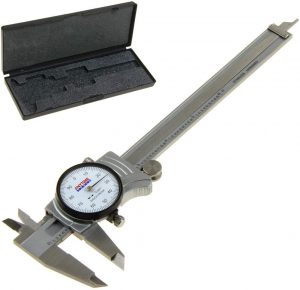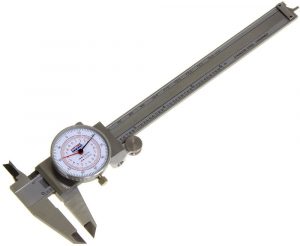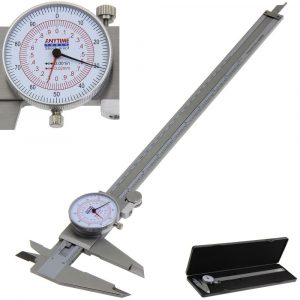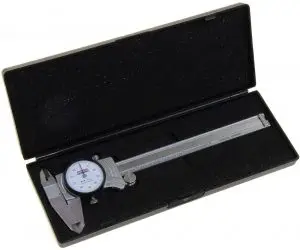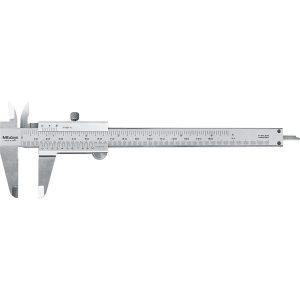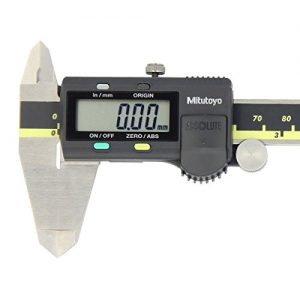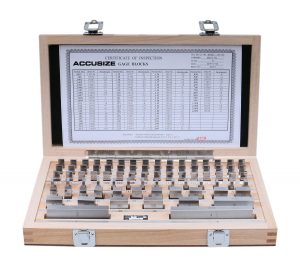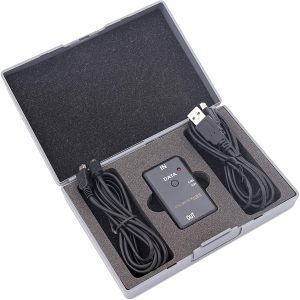
Pros
Price point
Customer service
No batteries required

Cons
Not "shock proof"
Table of Contents
ToggleFeatures
The Anytime Tools dial caliper is built to last, thanks mainly to its surprisingly solid construction. The hardened stainless-steel frame means it is rust-resistant, which is nice when the shop or garage it gets used in doesn’t always stay the cleanest. A sturdy build is great, but there are many other reasons why this precision measuring tool is a great buy.
This dial caliper from Anytime Tools has precision and accuracy in line with what you would expect to get from tools at a much higher price point. It is capable of taking internal, external, depth and step measurements with an accuracy of .001”. This means it competes directly with tools from companies like Starrett, Fowler and Mitutoyo.
If you need something more accurate, then look for a quality micrometer to get your measurement accuracy down to .0001” or better.
As a bonus to the sturdy build noted above, the tool is noted as being “Shock Proof”. While it might be a little more rugged than many other dial calipers, I wouldn’t recommend a drop test or something similar. It is a precision measuring instrument after all. Treat it like it is.
Luckily, the tool comes with a decent case to protect it when not in use. Again, this is a standard feature found on more expensive calipers, but one that is not always seen with tools in the same price range as this caliper from Anytime Tools.
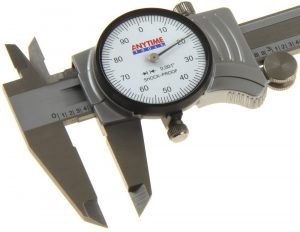
While the dial face is only protected by plastic, this is normal in most dial calipers nowadays. The Anytime Tools dial caliper has a nice, easy to read dial face as well as graduated scale on the body of the caliper.
Being easy to ready means the caliper is simple to use and the fact that it doesn’t require batteries like digital calipers do allows it to always be ready to use. No more problems dealing with dead batteries. This is great when the tool only gets sporadic or occasional use.
Nothing is more frustrating than needing to take a critical measurement and finding out that your batteries are dead. At best it means a trip to the store for a random battery size. At worst it means waiting a couple days for fresh batteries to arrive.
Please note that there are multiple versions of this dial caliper available and this review is based on the single scale 6” version. Many manufacturers make calipers in a wide variety of sizes. While they are all solid choices, there are some model specific notes below.
Dual unit scale version
The dual scale version of the 6” dial caliper takes measurements in both inches and millimeters. A black scale is used for the imperial units and red is used for the metric ones.
Generally, if you need to take measurements in both units then I would recommend a good digital caliper but if you are determined to stick with an analog caliper for any reason, then they make a good choice.
0-12" Dial caliper
6” dial calipers are a pretty standard fare. Many manufacturers have been able make a solid tool. As the caliper gets larger, it gets much harder to have a device capable of taking accurate measurements.
The 12” version of Anytime Tools caliper maintains the .001”/.02mm accuracy across the whole measuring range while maintaining the budget friendly price point similar to the 6” version.
This 12″ dial caliper also gives measurements in both inches and millimeters.
Verdict
The Anytime Tools dial caliper is a solid measuring device. It is reasonably priced and has features and accuracy that are comparable to tools that cost twice as much.
The dual unit version is a welcome convenience for those who will be working both inches and mm and the 12″ version does a great job of including premium features while maintaining the budget friendly price just like the 6″ caliper.
In short, all three versions are solid choices for a quality dial caliper.
Things to consider when purchasing a caliper
Digital vs dial vs vernier calipers
Quality measuring calipers are available in both analog and digital versions. There was a time where the digital versions were much more expensive than their dial and vernier counterparts. In recent years though, things have changed. The price difference has switched somewhat. Budget friendly digital calipers can be found for less than a budget analog caliper.
Whether you go digital or analog is really just a matter of preference. Some like having a tool that is always ready to use without the need for special batteries. Others like the simplicity of reading a digital display which saves them from having to use a scale and/or dial reading to calculate the measurement. Neither is difficult to use. Go with whatever you are comfortable using.
Measuring range
Calipers come in a wide range of sizes. The standard size is a 0-6” caliper but they can frequently be found in 0-4”, 0-8”, 0-12” and 0-24” varieties. One thing to think about is that as the tool gets larger, they can be more difficult to take measurements with. A 24” caliper can be unwieldy to use when trying to take a one-inch measurement.
If you think you will need a caliper with a larger measuring range such as a 12” or 24” version, then it is best to go with a 0-6” caliper and also a separate larger caliper. This will allow you to easily measure smaller sizes. For most users, measurements under six inches will make up the majority of their work. The larger calipers can then be used for the less frequent, larger measurements.
Accuracy
The accuracy of most calipers is fairly comparable. Unless you purchase an absolute bargain basement unit (something all plastic or similar), the accuracy of your caliper will be .001” or .02mm. If you need something more accurate then you will need to look for a micrometer instead.
I do recommend verifying the accuracy of your caliper by checking the calibration. Using a good set of gage blocks to check the calibration/accuracy is the best way to go.
If you don’t have access to a set of gage blocks then any known reference standard (known ball bearing, gauge pin, plug gage, etc.) can provide some confidence that the tool is accurate. Ideally, you will want to verify the tools accuracy across the whole measuring range. It is not uncommon for a tool to get damaged and give a correct reading for a 1” measurement while being multiple thousandths off at another interval such as 4.5”.
Used vs new
If they are treated well, a used caliper will be as good and accurate as a brand-new tool. In fact, many tools made 50 years or more ago are still in use and working well. The only caveat would be that you will want to verify the accuracy of a used tool before purchasing it.
Many times, a person in the machine shop industry will be getting ready to retire and will look to sell their prized tools. Knowing the history of a tool, and more importantly, knowing it was cared for can provide some certainty that you will be getting a quality tool.
Calibration certificates
Do not, I repeat do not bother spending the extra money to get a calibration certificate with your caliper. They should be accurate regardless. Furthermore, the calibration cert only guarantees the tool was accurate at the time of calibration.
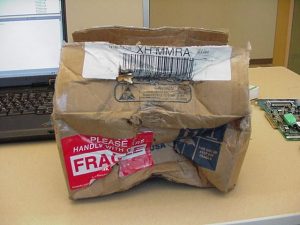
Have you seen how delivery drivers handle your boxes? Anything can happen in between the time of calibration and when the tool reaches you. Shipping companies don’t exactly have a reputation for being careful with packages during shipment.
Check it when you receive it and skip the added expense of calibration certificates.
Contamination protection
Standard dial calipers are pretty resilient to most normal forms of contamination that they will see such as oil and coolant. I still highly recommend keeping them as clean as possible. Keeping them in a case and even in a locked toolbox is always a good idea. Also be more wary of contaminants such as metal chips, dirt and debris. They are more likely to cause issues with your tool. A stray metal chip can cause your caliper to skip a tooth on the gear. This will lead to false measurements.
Data transfer
Data transfer is a nice feature but most often only something that a business will use. With that being said, you won’t find any data transfer capabilities on a set of analog calipers such as the Anytime Tools dial calipers. If data transfer is something that you require then find yourself a good digital caliper. However, keep in mind that sometimes the cable to make the data transfer costs more than the caliper itself.
Related articles
For more information check out these related articles:
